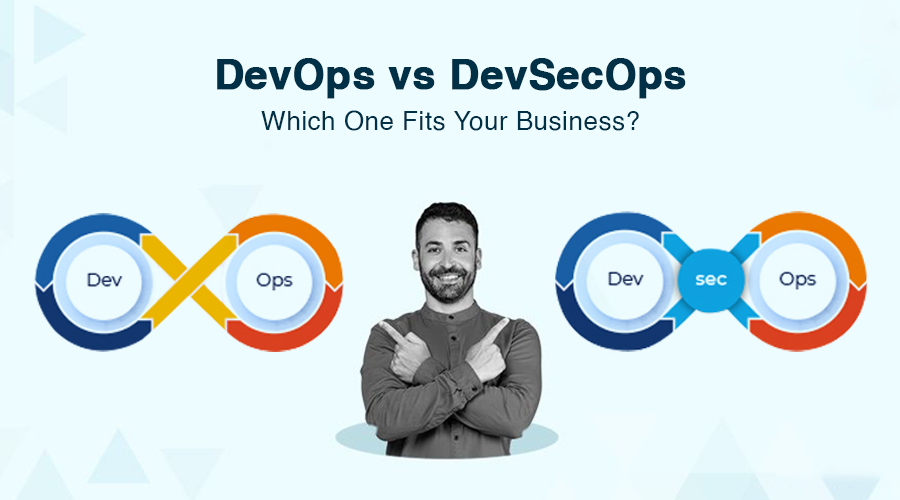77% of businesses currently use DevOps for the agile software deployment process. On the other hand, 15 % have yet to plan the adoption of DevOps, and 9% of organizations have yet to begin their DevOps journey. [Source: esparkinfo]
This number indicates how businesses are striving for agile methodology. But does DevOps ensure security and seamless operations? Well, the experience varies. Some have found DevOps have security issues. Businesses can have security concerns about DevOps. A team of DevOps Engineers believes in an agile development and operation process. They see security checks and testing as interference.
This process consumes time and causes delays. As a result, they sometimes skip some of the security steps and use several automation tools. Everything adds up as a risk to the overall security of the cloud system. So, is there any way out? Yes, DevSecOps comes here to bridge the security gaps in DevOps. This blog will explore DevOps vs. DevSecOps to help you determine the best approach for your business needs.
DevOps Vs. DevSecOps: Things You May Ask to Know
What is DevOps?
DevOps is an agile methodology that ensures seamless collaboration between development and operations. DevOps focuses on streamlining the software lifecycle. The primary goal of DevOps is to ensure that nothing can come between the processes. It eliminates any inefficiencies that cause unnecessary delays in the deliverables. DevOps facilitates continuous improvements and automated tasks and enhances cross-team collaborations. In short, DevOps is beyond a tool; it’s more like a guided workflow that makes software deployment hassle-free and seamless.
What are The Key Elements of DevOps?
Continuous Automation:
DevOps facilitates the constant automation of repetitive tasks in testing and deployment using various DevOps tools.
Continuous Integration:
DevOps continuously merges codes, optimizes or changes them into hard respiratory codes, and fixes performance issues caused by new updates, errors, and conflicts.
Continuous Development:
One of these key elements of DevOps is proper version control and documentation through continuous code changes and updates.
Collaboration:
Eliminate any steps that are inefficient in workflow with any efficient collaboration in cross-teams.
Configuration Management:
Configuration management maintains system consistency and enforces compliance with predefined environmental settings. With up-to-date insights, configuration management enables teams to prevent disruptions and maintain high-performance service.
What is DevSecOps?
DevSecOps involves security checks throughout the pipeline. It’s more like the extension of the DevOps principles. Instead of the security check at the process end, it involves security checks at every step of the software development cycle. DevSecOps ensures that software security is no longer a task for a few people; it’s a shared goal. The stakeholders, including the operation, developers, and the security team, ensure that vulnerabilities are addressed early and the process is agile and secure.
What Are the Key Elements of DevSecOps?
Security by Design
Embedding security measures from the beginning of the development process is one of the key elements of DevSecOps design.
Automated Security Testing
Continuous vulnerability basement and compliance test through security scanning and composition analysis tools.
Threat Modeling and Risk Analysis
Anticipating the potential risk on sensitive data using risk and treatment analysis. Compliance and Governance Ensuring regulatory requirements are made with continuous monitoring and testing of vulnerabilities.
DevOps VS DevSecOps: What’s the Differences?
Here are the core differences Between DevOps And DevSecOps:
Security Integration
DevOps Multiple security checks are referred to as mere interference that consumes time and delays the project. That’s why they come in as the end process. DevSecOps Security integration comes at every step to ensure the process is faster yet secure.
Risk Management
DevOps DevOps workflow is basically the operational risk to ensure the seamless performance of the software. DevSecOps DevSecOps focuses on security risks by adding security patches at every step to mitigate technological vulnerabilities.
Collaboration
DevOps Developers, operational team, and development: At the process end, the security team takes care of the security process. DevSecOps Developers, security teams, and operations ensure security against vulnerabilities through effective team collaboration.
Automation
DevOps utilizes automation tools to streamline repetitive tasks and facilitate seamless deployment. DevSecOps DevOps enhances workflow automation by embedding security testing directly into the development pipeline.
DevSecOps VS DevOps: in Business Landscape
Consider your business priorities and industry requirements to make the right choice between DevOps And DevSec Ops. While both approaches streamline software development and deployment, the key difference lies in the process security.
If speed and efficiency are your business's basic concerns, DevOps is the right tooling. DevOps is the best choice for startups and mid-sized organizations that primarily want to streamline development without major compliance concerns. Businesses that focus on rapid software delivery and operational efficiency can also benefit from DevOps.
Companies where security can be addressed later or handled by a separate team can also opt for DevOps. DevSecOps, on the other hand, integrates security at every stage. This approach is essential for industries handling sensitive data. Companies dealing in finance and the healthcare sector can benefit from DevSecOps. It's also a vital tool to ensure safety in the government sector.
Get Custom-Built DevOps Solutions for Faster, Smarter Deployment!
Final Thoughts on Choosing Between DevOps and DevSecOps
DevSecOps is an evaluated version of DevOps. It bridges the security gaps in DevOps workflow and strengthens the agile workflow of DevOps by embedding security. If your business operates in a high-risk environment, investing in DevSecOps will benefit it. This will reduce security risks and ensure compliance without slowing down the development and deployment process of your software product.
What’s Next?
The Tech Clouds team is here to help your business take the ambitious next step. Choose fast and secure DevOps solutions with us. Have a query relating to the idea of hiring a dedicated DevOps engineer? Book a free query call now!


